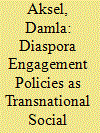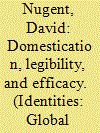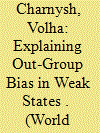|
|
|
Sort Order |
|
|
|
Items / Page
|
|
|
|
|
|
|
| Srl | Item |
| 1 |
ID:
128461


|
|
|
|
|
| Publication |
2014.
|
| Summary/Abstract |
An emphasis on making markets work for the poor has thrust companies into the role of 'development agents' - organisations that consciously seek to deliver outcomes that contribute to international development goals. This paper examines what business as a development agent means in terms of the promise, the conceptualisation and the developmental outcomes of several initiatives engaged in 'bottom billion capitalism'. It argues that, while these initiatives are hailed as a solution for poverty, the benefits of such engagement must be weighed against other factors, including exclusion, the emphasis on capital assets and the reinterpretation of positive outcomes. The paper presents an alternative model of business as a development agent that better meets the criteria for a genuine development actor.
|
|
|
|
|
|
|
|
|
|
|
|
|
|
|
|
| 2 |
ID:
188175


|
|
|
|
|
| Summary/Abstract |
In examining the transformations in statecraft, the existing scholarship on Turkish diaspora policies largely adopts Foucault’s governmentality perspective and suggests that the shifting policies reflect the home states’ attempt to assert control over citizens, not through coercion but rather through consent. While this framing has proved workable, it provides limited room for students of diaspora studies to incorporate the overall conceptualization on the resistance in which the non-resident citizens and countries of residence engage vis-à-vis home country politics and the potential failures of these policies. I propose to follow James Scott’s legibility framework to emphasize that the home states’ evolving policies to engage with non-resident citizens is a social engineering project, aiming to facilitate the state’s ability to monitor and mold the behavior of mobile populations in the context of neoliberal globalization. I argue that the legibility framework allows us to analyze not only the standardization processes, but also the resistance against it both from the migrants and from their countries of residence. To make my argument, I employ the framework to the case of Turkey, which has received considerable attention since the mid-2010s. This article is based on archival research of Turkish state documents on emigration, empirical research conducted between 2013 and 2014 involving nearly 100 interviewees including Turkish state officials in Turkey and with migrant representatives in France and the United States, and further examination of secondary resources, including informal talks with policy makers and diaspora representatives in the post-2016 period.
|
|
|
|
|
|
|
|
|
|
|
|
|
|
|
|
| 3 |
ID:
093995


|
|
|
| 4 |
ID:
185604


|
|
|
|
|
| Summary/Abstract |
Two dominant explanations for ethnic bias in distributional outcomes are electoral incentives and out-group prejudice. This article proposes a novel and complementary explanation for the phenomenon: variation in legibility across ethnic groups. The author argues that states will allocate fewer resources to groups from which they cannot gather accurate information or collect taxes. The argument is supported by original data on state aid from the 1891/1892 famine in the Russian Empire. Qualitative and quantitative analyses show that districts with a larger Muslim population experienced higher famine mortality and received less generous public assistance. The Muslims, historically ruled via religious intermediaries, were less legible to state officials and generated lower fiscal revenues. State officials could not count on the repayment of food loans or collect tax arrears from Muslim communes, so they were more likely to withhold aid. State relief did not vary with the presence of other minorities that were more legible and generated more revenue.
|
|
|
|
|
|
|
|
|
|
|
|
|
|
|
|
| 5 |
ID:
145743


|
|
|
|
|
| Summary/Abstract |
Performance evaluation systems fundamentally shape the behaviour of Chinese judges, but scholarship on the concrete implementation of these institutions is scarce. Relying on nearly 15 months of fieldwork in six cities in China, we explain how the judicial cadre evaluation system, as unified by the 2011 “Guiding opinion of the Supreme People's Court,” has been implemented. Over 30 indices quantitatively measure Chinese courts’ “fairness” (gongzheng 公正), “efficiency” (xiaolü 效率) and “impact” (xiaoguo 效果), incentivizing court leaders to pressure their subordinate judges to resolve disputes as quickly as possible without unduly angering litigants or other actors. Under the hyper-quantified conditions of cadre evaluation, systemic praising and shaming bring about what we call “intra-state legibility,” which leads to a variety of informal worker reactions to these tactics. This study not only uses interviews and new documentary evidence to add necessary detail to our understanding of cadre evaluation systems, it also engages debates in comparative law and politics regarding bureaucratic influence on authoritarian judicial behaviour.
|
|
|
|
|
|
|
|
|
|
|
|
|
|
|
|
| 6 |
ID:
144352


|
|
|
|
|
| Summary/Abstract |
This paper questions the effectiveness and usefulness of the Russian government's policies of migrant integration. Using a unique combination of ethnographic research methods (observations, interviews and survey) with methods from psychology (cognitive mapping) and urban studies (GIS mapping), I depict the presence of Central Asian migrants and their interaction with local long-term residents in two cities of the Russian Federation: Kazan and Saint Petersburg. On the basis of my findings, I argue that the readability (defined as the ease with which the city can be ‘read’ and understood) and legibility (defined as the degree to which individual components of an urban environment are recognizable by their appearance) of urban space in Kazan have positive effects on the relationship between these two communities, while the ambiguity and uncertainty of urban identity in Saint Petersburg make the life of migrants very vulnerable and unpredictable, and result in the growth of xenophobic views among the local residents. This allows me to argue that the policy of migrant integration will be more successful if it is built on learning to live with differences, instead of trying to ‘Russify’ migrants or create various forms of supra-ethnic identity.
|
|
|
|
|
|
|
|
|
|
|
|
|
|
|
|
|
|
|
|
|